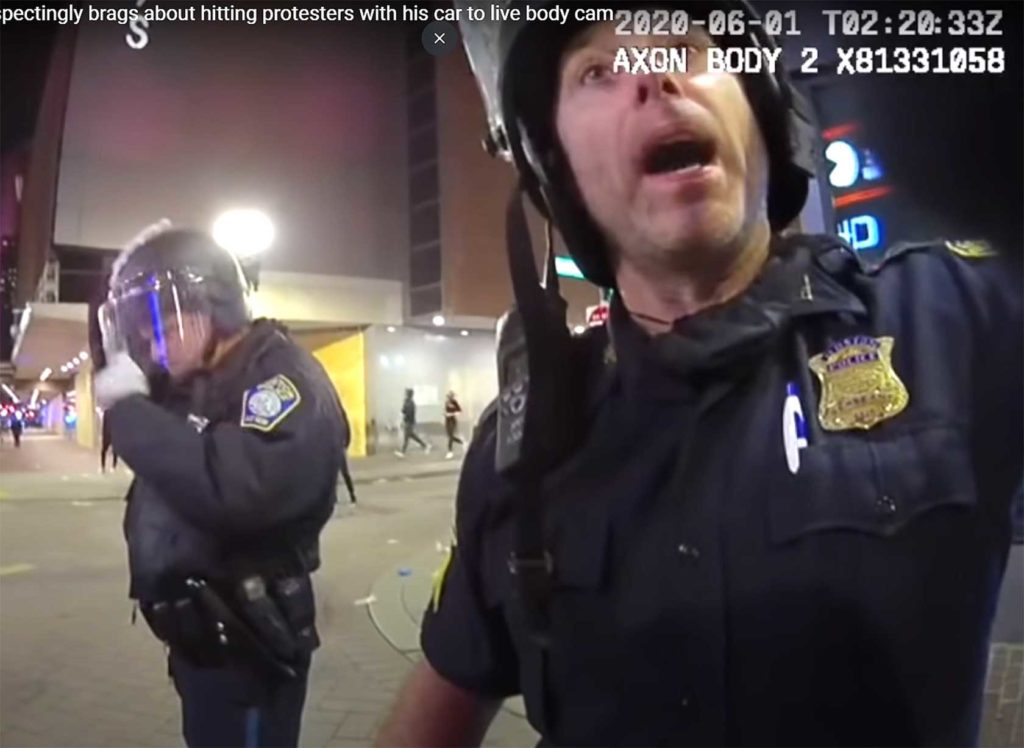Cop who bragged he hit protestors returns
Officer caught on bodycam is back after eight-day suspension

A Boston police sergeant who was caught on video saying he had run down protesters was reinstated to full duty with an eight-day suspension following months of desk duty.
The sergeant, Clifton McHale, was seen speaking in footage from another police officer’s body camera taken during protests in Boston on May 31, 2020, following the death of George Floyd in Minneapolis. In the video, first published by The Appeal, McHale said he was hitting protesters with his car. Later, in the same clip, he backtracked and said he didn’t hit anybody.
An internal investigation, launched in December when the video was released, found that McHale didn’t strike anyone with his car.
Carl Williams, an attorney who represented protesters charged in the demonstration and first received the footage, said that whether or not McHale actually hit anybody, his conduct and the resulting decision were “outrageous.”
“If it was a firefighter, and they said, ‘Oh, guess what I do, I set people’s houses on fire. It’s super funny, I’ve been doing it all week,’ you’d be like, ‘You’re not going to be a firefighter anymore. You’re not keeping the city safe,’” Williams said.
Howard Friedman, a local attorney who works in cases of police misconduct, said that someone making comments like the ones McHale did shouldn’t be supervising other officers.
“What he said was wrong, and whether he did it or not isn’t the key factor, it’s what he said,” Friedman said. “And an eight-day suspension feels like nothing.”
McHale was previously accused of sexually assaulting a woman. In 2005, McHale, while working a paid detail at Faneuil Hall, offered to drive a drunk woman back to her hotel. She accused him of assaulting her. An internal affairs investigation at the time concluded he had engaged in inappropriate sexual relations with the woman, according to a Boston Globe report. McHale took a one-year suspension.
Over the past year, officials in Boston have taken some steps to address police accountability. In January, then-Mayor Martin Walsh signed an ordinance to create the Office of Police Accountability and Transparency, which held its first public meeting Oct. 4.
In May, acting Mayor Kim Janey signed an ordinance adding restrictions to when Boston police can use crowd control measures such as tear gas, pepper spray and rubber bullets.
The ordinance, sponsored by City Councilors Ricardo Arroyo and Andrea Campbell, had previously gone through the City Council only to be vetoed by Walsh in January.
But for Williams, actions to address police accountability should go further.
“I saw literally tens of thousands of people — young Black people, brown people, people who care about racial justice and Black liberation — and they were saying pretty much one thing, and that was abolish or defund the police,” Williams said.
The phrase, which boomed during the nationwide protests following Floyd’s death, can be used to describe shifting various portions of the police budget, but Williams supports defunding 100% of the police budget.
“I think that takes a long time, and I think it’s an ideal that we strive for,” Williams said.
Friedman described his vision for a solution without the phrase “defund the police,” calling it a red-flag term and opting instead for what he called “properly funding the police.” What he described was what some proponents of defunding the police support: shifting some responsibilities — and the funding that would go with it — from the police department to social service agencies.
“Some tasks, I think, should be handled by other agencies,” Friedman said. “People who actually have experience with helping people with mental illness, helping people with drug addiction, should be doing that.”
When asked what the upcoming mayoral election means for conversations about police accountability in Boston, Williams said he isn’t endorsing either candidate, but drew a distinction between candidates Annissa Essaibi George and Michelle Wu.
“I think one of them [Essaibi George] is that really 19th-century solution of more cops, support cops, support prosecutors, support jails, and one of them [Wu] is much more — I hope — a 21st-century solution, William said. “I don’t particularly endorse anyone, but I think Michelle Wu is a person who is looking into the future. I think Annissa Essaibi George is a person who’s looking to the past.”






